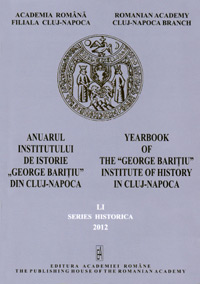Diplomaţie şi război. Competiţia austro-rusă şi primele tentative consulare în Serbia lui Karadorde
Diplomacy and war. The Austro-Russian competition and the first consular attempts in Karadorde's Serbia
Author(s): Ela CosmaSubject(s): History
Published by: Editura Academiei Române
Keywords: Austro-Russian competition; Karadorde's Serbia; diplomacy; consular attempts
Summary/Abstract: In their expansionist competition, both Russia and Austria alternated their alliances with Karadorde's Serbians, engaged in the conflict against the Ottoman Porte, with periods of retreat of their support. The oscillating attitude of the two great powers is to be explained by the current necessities and the pursuance of their own interests. Like the Romanian Principalities, Serbia too became an object of rivalries between the imperial states, wishing to impose here their influence or domination. During the first Serbian uprising (1804-1813), Russia exerted a contradictory attitude on military and diplomatical level. Serbia instead displayed a constant sympathy, regardless of any disappointments: Czartoryski's refusal to Matija Nenadovic's embassy (1804), the failure of the first Tsarist diplomatic mission lead by the hostile Rodofinikin (1807-1810). But Russia also sent enthusiastic emissaries: Isaev and Paulucci (1807), Zuccato (1810), Marko Ivelic (1812). The uprisal defeat found the Serbians alone in their confrontation with the Ottoman enemy, which would eventually shake their reliance on the military power and political will of the Tsarist Empire to support them. Neither showed Austria more compassion and correctness in the bilateral relations with Karadorde's Serbians. The positive side consisted in Austria's modernization efforts in Serbia, especially in terms of market economy and Western civilization model. The negative side is linked with the Habsburg Empire's interests, the promotion of the status quo in the Balkans, with the sacrifice of the smaller nations striving for statal autonomy. In fact, the Serbians perceived Austria's timing game as an endless line of betrayals. Rodofinikin's mission to Belgrade determined Austria's reaction to propose a consul as well. The first Habsburg attempt in 1809-1810 to institutionalize the Austro-Serbian relations by creating an Austrian consulate went hand in hand with the Monarchy's endeavour of taking over the role of a mediator in the Turkish-Serbian conflict. The general commander of the Slavonian and Syrmian military border, baron Simbschen, was charged with diplomatic powers in the Serbian cause. But Simbschen's negociations failed and he was dismissed. The espionage networks built up by Rodofinikin and Simbschen fell together with their initiators. Equally secret, the projects for a Serbian constitution elaborated by the two empires - projects based on the set up of the Romanian Principalities and of the Austrian military border - reveal other thoughtful means envolved in the HabsburgTsarist competition for winning Serbia. Both the question of the Serbian constitution and that of the establishment of foreign consulates in Belgrade were to be solved in the fourth decade of the 19th century, when Russia and Austria again assumed a major contribution.
Journal: Anuarul Institutului de Istorie »George Bariţiu« - Series HISTORICA
- Issue Year: LI/2012
- Issue No: 51
- Page Range: 199-228
- Page Count: 30
- Language: Romanian

